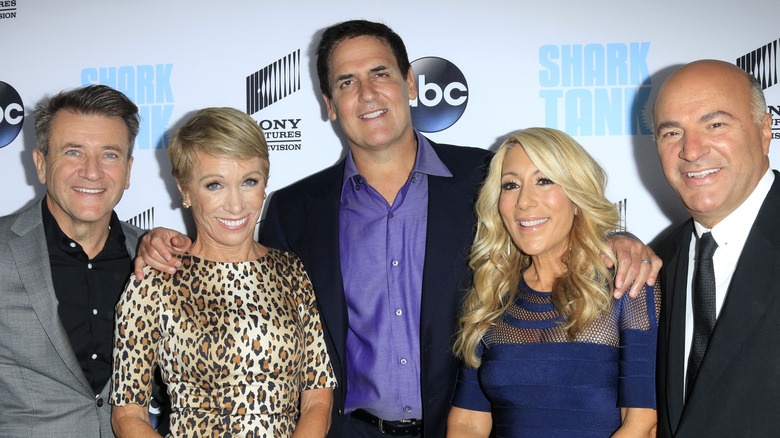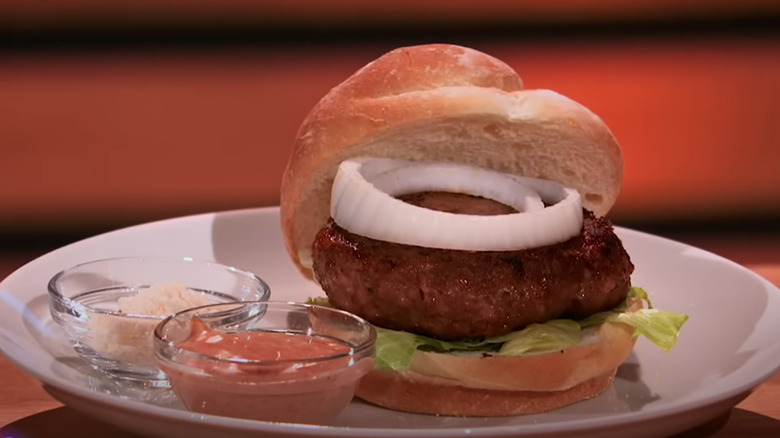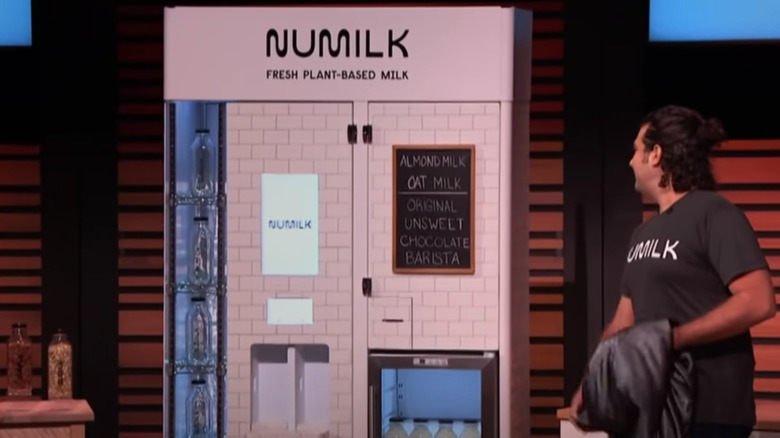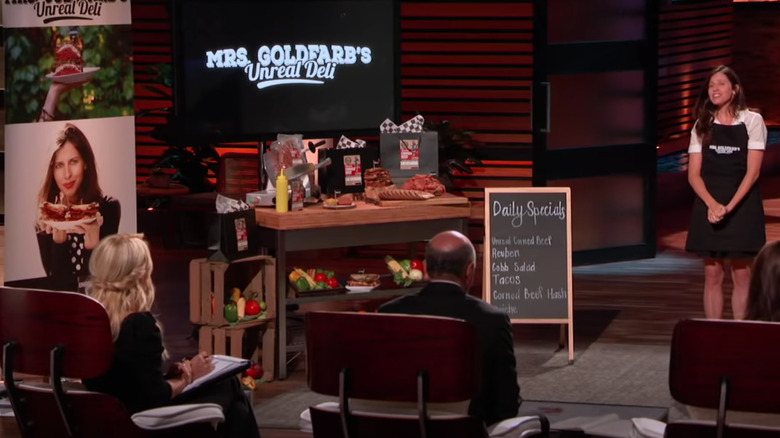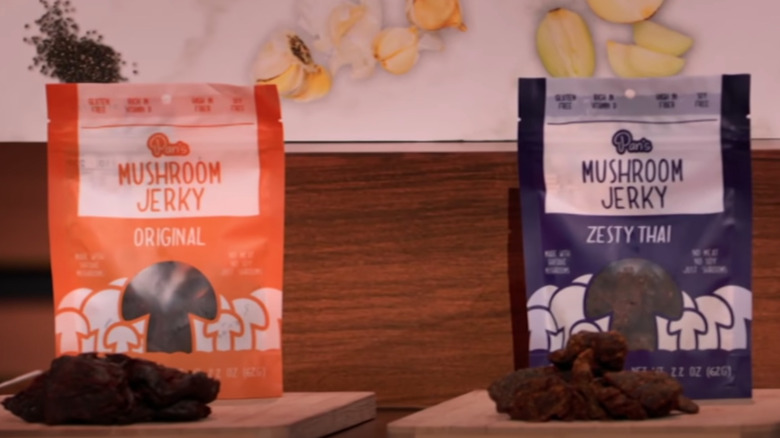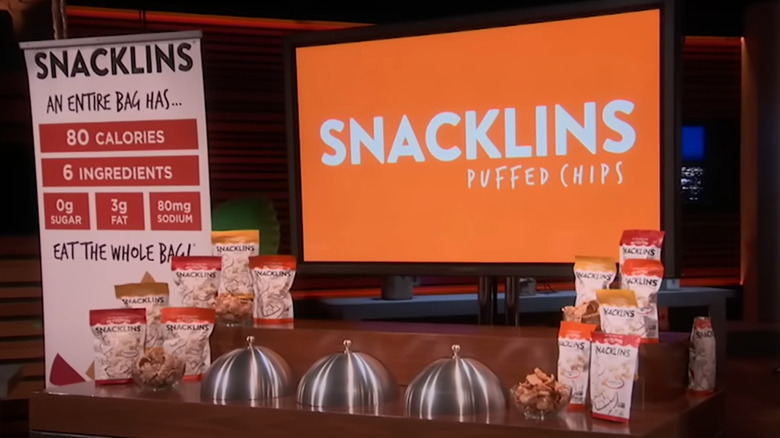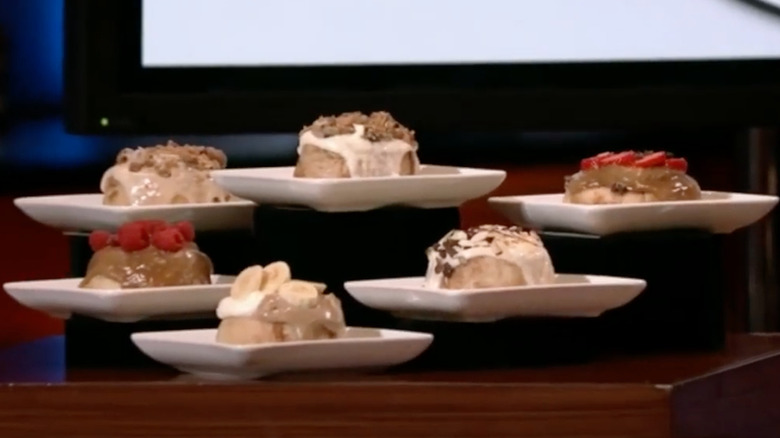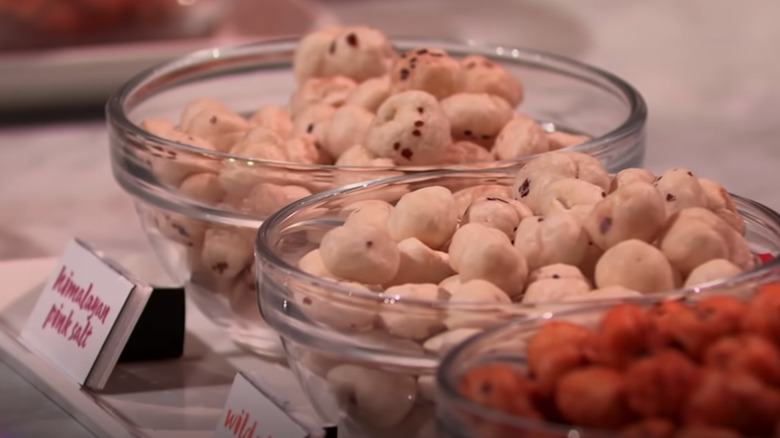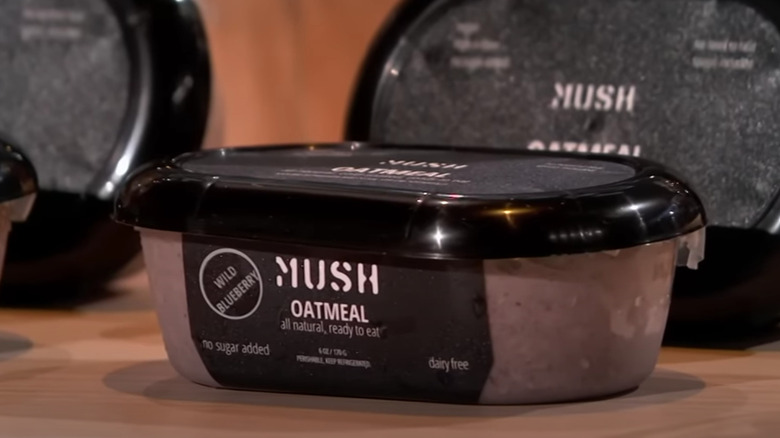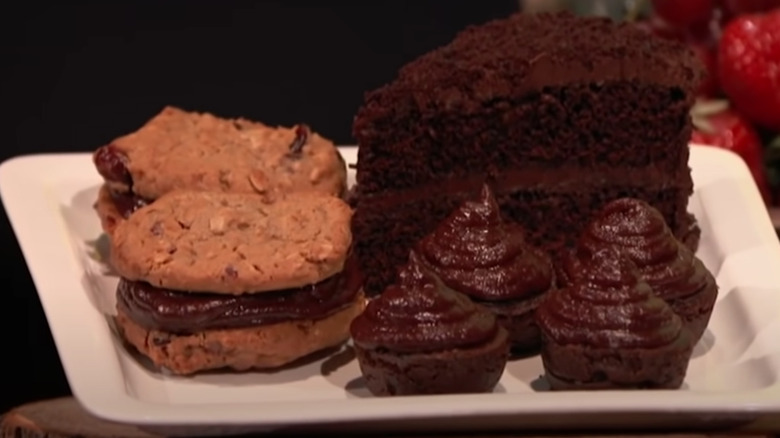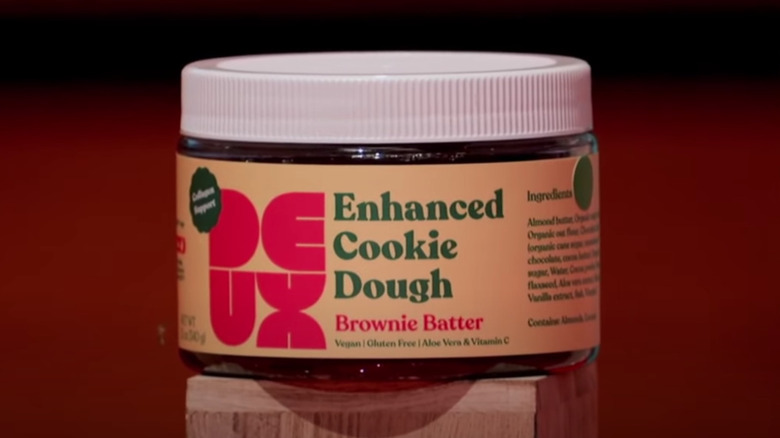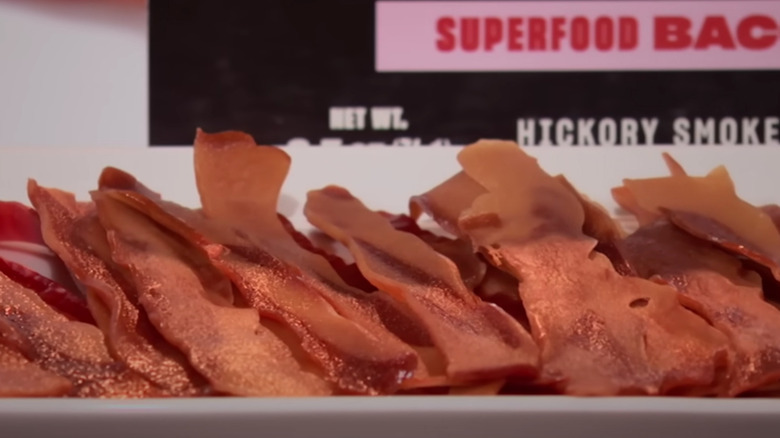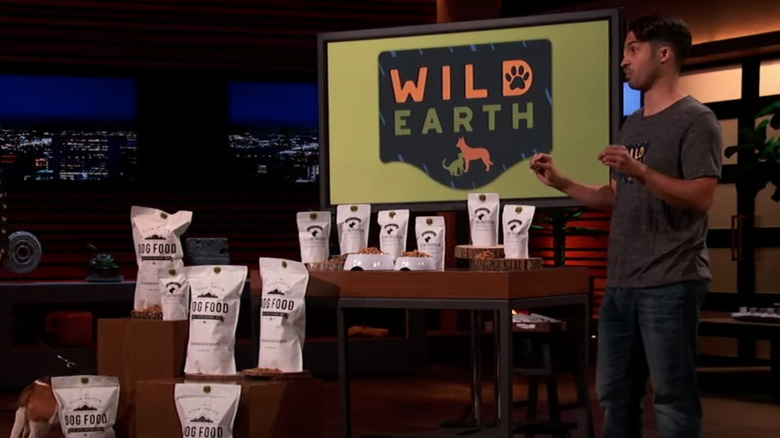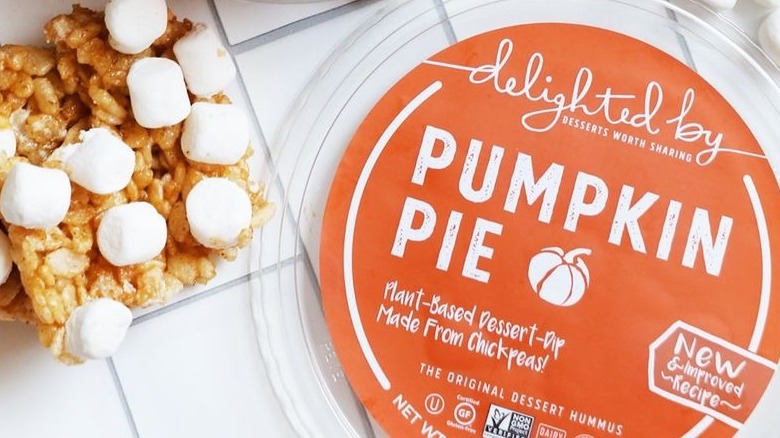13 Most Successful Vegan Deals To Come Out Of Shark Tank
Many successful ideas have come out of ABC's American reality television series "Shark Tank." The premise? Established and budding entrepreneurs get to pitch their ideas to a revolving team of big-time entrepreneurs and business moguls otherwise known as "sharks." The most frequently appearing business giants on this show are Barbara Corcoran, Lori Greiner, Daymond John, Kevin O'Leary, Robert Herjavec, and Mark Cuban.
Some people go vegan for the health benefits. According to HealthLine, there are advantages to following a plant-based diet. Avoiding meat and dairy can be beneficial to maintaining a healthy body weight, lower blood sugar levels, and can lower the risk of diabetes, cancers, and heart disease.
Cuban, known for investing in the most vegan food deals on the show, and though not vegan himself, he is a proud vegetarian. While not every deal impresses all of the judges, it only takes one to turn an already existing business into a huge profit. Here are the most successful vegan deals to come out of "Shark Tank."
Everything Legendary
Meat. An ingredient notorious for its difficulty to be replicated as a plant-based option. Well, Everything Legendary is a vegan meat company based in Washington, D.C. and their appearance on "Shark Tank" changed that in season 12, episode 15.
When CEO of the company Duane Cheers' mother went vegan to manage a chronic health condition, she wasn't enjoying the common vegan meats available at the grocery stores, according to Totally Vegan Buzz. Cheers' mission became to make a delicious plant-based burger. He teamed up with Danita Claytor and chef Jumoke Jackson, and together they sold the product at local pop-ups and street festivals.
Mark Cuban, an entrepreneur and American billionaire, invested $300,000 for a 20% stake in the Black-owned vegan meat company, despite the original ask of $300,000 for 10%. Shark and entrepreneur Kevin O'Leary called it "the best burger that's plant-based" that he's ever had in the brand's "Shark Tank" pitch, via CNBC Prime. Selling a quarter of a million dollars' worth of vegan burgers within only 24 hours after the episode aired, this company is one of the most successful vegan deals to come out of "Shark Tank." In 2022, Everything Legendary closed a Series A Investment round of $6 million dollars led by Circle Up Growth Partners, and backed by General Mills, we learn from Food Dive. The item is now sold in over 300 Target locations nationwide since 2021, according to Black Enterprise.
Numilk
Plant-based milks have been all the buzz for some time now, with many ingredients like almonds and oats replacing cows for those who prefer to avoid dairy. According to Engineering, Numilk is a plant-based milk company that serves it a little differently. Based out of Westchester, New York, the brand made an appearance on Shark Tank in 2021, when entrepreneurs Ari Tolwin and Joe Savino pitched their product made from real ingredients but available in a self-service machine, according to CNBC.
Noting the number of people who no longer consume cow's milk but prefer alternative options such as almond, oat, or hemp, Tolwin and Savino made their nut milk-producing kiosks for shoppers at grocery stores to be able to get fresh dairy-free milk in 60 seconds, boasting a seven- to 10-day shelf life, GMO and gum-free. For just $2 per bottle, consumers can refill their bottles when they come back for more without paying an additional fee for a new bottle.
Numilk struck a $2 million deal with Mark Cuban for a 10% share, despite their original pitch of wanting $1 million for a five percent stake in the company, as seen on their Shark Tank pitch on season 12, episode 18 of the show, via Sony Pictures Television.
Mrs.Goldfarb's Unreal Deli
Another attempt to market replacement meat lies in a business known as Mrs. Goldfarb's Unreal Deli, which appeared on season 11, episode 8 of "Shark Tank." Rather than replicating burgers or ground beef, Mrs. Goldfarb's creates vegan deli meat for consumers to enjoy in sandwiches, or for delis to carry as a meatless option.
Founder Jenny Goldfarb went vegan in 2014 after learning about the meat industry and animal cruelty, having previously been a meat-eater her whole life, according to Veg World Magazine. So, she came up with a vegan corned beef made from a chickpea, beet, tomato, and spice mixture, according to CNBC. Seeking $100,000 for a 10% stake, she was offered $100,000 for 20% of the company by Kevin O'Leary. Goldfarb wasn't sold on this. Mark Cuban offered $250,000 for a 20% stake and they struck a deal together. At the time she pitched, her company was only making $10,000 in annual revenue.
Although Mrs. Goldfarb's Unreal Deli thrived after the television show appearance, it took a hit in 2020. As a result, the business pivoted to the retail space and came up with another flavor — vegan turkey meat. Before "Shark Tank," Goldfarb sold her product at 300 grocery stores. Her vegan deli meats are now rolling in the cash, with about $4 million in annual revenue, thanks to Cuban's help, we learn from Shark Tank Recap.
Pan's Mushroom Jerky
Just when you thought Mark Cuban might be running out of money because he's invested in most vegan deals on this list (spoiler alert: he's got the money to spare), he found confidence in Pan's Mushroom Jerky, a vegan meat company producing jerky from shiitake mushrooms. Flavors include zesty Thai, applewood barbecue, and salt and pepper, and are all soy- and gluten-free, according to the company's website. Boasting a meaty texture and umami taste, founder Michael Pan launched the business in 2018, modeled after a family recipe. Produced in Portland, Oregon the jerky is now available in over 3,500 stores in the United States including Walmart, Kroger, Whole Foods, and Amazon.
Founder of TOMS Shoes and guest shark Blake Mycoskie and entrepreneur and multi-millionaire Lori Greiner offered Pan a deal together, according to his "Shark Tank" pitch via YouTube. Offering $300,000 for a 15% stake each, Pan wasn't so sure about giving away 30% of his company. Mark Cuban swooped in and offered $300,000 for an 18% stake and Pan happily took it, despite his ask of $300,000 for 10%.
Within 24 hours of the agreement, the company sold $650,000 worth of jerky and hit $1 million in sales in just four days, we learn from Yen News. In March of 2020, the company increased production to meet demand by moving the business to a new facility with more space, reaching $620,000 in sales, according to Food Business News.
Snacklins
If going plant-based or you'd prefer a healthy alternative to meat, the world of pork rinds just opened up for you. As a Muslim person, founder of Snacklins Samy Kobrosly wanted to recreate pork rinds, in vegan form so that he'd be able to enjoy the snack without the use of real pork, according to his "Shark Tank" pitch on YouTube. Made from yucca, mushrooms and onions, Kobrosly asked the sharks for $250,000 in exchange for a 2.5% stake in his company.
At 80 calories per entire bag, Snacklins come in flavors including barbecue, miso ginger, and Chesapeake Bay. Though the sharks were impressed by Kobrosly, they were slightly put off by the small 2.5% share, and most opted out.
After some negotiation, Mark Cuban modified the deal and offered $250,000 for 10% of the company, striking an agreement with Snacklins. The company pulled in about $100,000 in sales within seven days of airing on Shark Tank, according to Shark Tank Recap. Now, Snacklins can be found in stores all over the East Coast, including Whole Foods, Walmart, and Stop & Shop.
Cinnaholic
Founders of vegan cinnamon roll company Cinnaholic Shannon and Florian Radke appeared in the tank on season 5, episode 28. In their pitch via YouTube, the potential investors were very impressed with the product, audibly saying "wow" as they gave it a bite. Seeking a fund of $200,000 for 20% of their company, they agreed on a deal with shark Robert Herjavec but in exchange for a 40% stake instead, according to QSR. Together, they agreed that the money would be used to invest in nationwide shipping of the vegan cinnamon rolls.
However, Cinnaholic's story comes with a plot twist. After the episode aired, the Radkes pulled out of the deal to focus on their company's storefronts instead. The reason? The founders believed their cinnamon rolls are generally better quality when eaten the day they are made, and they don't do terrifically well when shipped across the U.S. As they are custom-made, it's also more difficult to present them if they ship.
Despite the decision some might question, especially in the wake of 2020 when the company had to open its services to meet the to-go lifestyle despite their "Shark Tank" deal's outcome, the company has grown a lot from its television appearance. In 2020, the company opened 14 locations and franchises later controlled all 50 of their locations. It plans to grow internationally, and Cinnaholic now boasts five locations in Canada.
Bohana
Nadine Habayeb, an immigrant from Dubai living in Boston, Massachusetts partnered up with Priyal Bhartiya to create their snacking product, Bohana, according to Biznewske. Similar to popcorn, Bohana is made from popped water lily seeds, according to Habayeb's "Shark Tank" pitch on Youtube. With 15% more protein and fewer calories than popcorn, the snack doesn't contain kernels, making it healthier and hassle-free.
Giant lily plants native to India produce seeds that pop out of their shells when placed over high heat, like popcorn would. When the company appeared on the show in season 11, episode 16, Habayeb asked for $200,000 in exchange for a 10% stake in the company. Being the first ever maker of this product in the U.S, the sharks recognized that education would be needed to sell the product. Only two sharks bit.
Barbara Corcoran's offer of $200,000 for a 30% stake was worrisome to Habayeb, and Kevin O'Leary's offer of a $200,000 loan for 8% stake was much more appealing, and they took the deal to grow the company. Since 2022, it is valued at $4 million. Bohana has been featured on The Boston Globe, the Today Show, NPR, Forbes, and Food Network to name just a few, where they've won the hearts of snackers everywhere (courtesy of their website.)
MUSH
You might have seen MUSH at your local health food store or even grocery store, and wondered what it was. Founders Ashley Thompson and Kat Thomas, who are based out of San Diego, California, created a portable way to snack on oatmeal with a small plastic spoon included in the lid, appearing on season 9, episode 12 of "Shark Tank," as seen via their pitch on YouTube.
Seeking $300,000 for a 10% stake in their company, their product is nutrient-dense and high in protein and fiber, with low amounts of sugar. Impressing the sharks with the array of flavors offered, including their original vanilla bean, dark cocoa, blueberry, and cold brew, guest shark and businessman Rohan Oza made the first offer of $400,000 for 20%. Mark Cuban swooped in and Barbara Corcoran followed suit with a cash offer, and the two founders decided on Cuban's offer which matched their original ask, according to Bizz Bucket.
That same year, MUSH made $120,000 in sales. That's nearly double what they made their first year in business selling their product at farmers' markets and Whole Foods. After a year and a half, the company drew in $5 million dollars in sales.
Wanna Date?
Founder of Wanna Date? Melissa Bartow didn't introduce a new dating concept when she appeared on "Shark Tank" on season 11, episode 12, as seen on her pitch via Youtube. Instead, she introduced her naturally sweet product, a versatile and vegan date spread that can be smeared on sandwiches with fruit in them or even atop ice cream. Completely allergen-free, the spread is meant to curb processed sugar cravings and help consumers enjoy sugar naturally.
Seeking $100,000 for a 20% stake in her company, Bartow ended up taking Mark Cuban's offer of $100,000 for 33% of the company.
According to Wanna Date's website, the company now offers many flavors including one basic date flavor (as Mark Cuban advocated for as part of their deal together) as well as chocolate, cinnamon, snickerdoodle dough, and pumpkin spice, to name a few. Since the "Shark Tank" deal was struck, Wanna Date? has a lifetime sales of $4.7 million and appears in 128 grocery stores, we learn from Shark Tank Blog.
Deux
Entrepreneur Sabeena Ladha started her vegan and gluten-free cookie dough company on her Instagram in 2020, according to Shark Tank Talks. After an increase in demand for her products, she created Deux Foods Inc. Her dough is made from oats, nut butter, vanilla, maple syrup, coconut sugar, water, and flaxseed. Advertised as "enhanced cookie-dough," it contains amino acids, pea protein, mushrooms, vitamin D, and elderberry. She asked for $300,000 for a 10% stake in the company.
Here's the plot twist – no deal came from her television appearance on "Shark Tank" on season 13, episode 6, as seen via her pitch on YouTube. A deal was originally offered by Robert Herjavec of $300,000 for 15% of her company, but he took it back when Ladha appeared unsure about what she wanted and made a counteroffer, despite him noting that he didn't want to negotiate further.
According to the company's website, Deux comes in 11 flavors including s'mores, birthday cake, and brownie batter, for $16 a jar. The company has now been featured in Forbes, The New York Times, and Today, and reached a million-dollar value in just one year.
Umaro Foods
Beth Zotter and Amanda Stiles are two scientists from Berkley, California. Together, they founded Umaro Foods, a company producing vegan bacon, and appeared on "Shark Tank" on season 13, episode 18. Their product can be served crispy or soft, and is made from chickpeas, coconut, sunflower, paprika for color, sea salt, and their star ingredient: red seaweed, according to the company's website. Their net worth is now estimated at $14 million since their appearance on the show, we learn from Shark Tank Talks.
Asking for $500,000 in exchange for a 2% equity stake, the sharks' reactions were similarly unenthused, noting the low percentage considering the tall ask.
Mark Cuban invested in Umaro Foods for a deal of $1 million for a 7% stake, despite his original offer of an 8% stake with some negotiation on Zotter and Stiles' part, according to Vegconomist.
Why use seaweed to make vegan bacon? Their reasoning lies in this ingredient's ease of production, as it doesn't need fertilizer to grow and grows at a rapid pace. As a superfood, it's high in protein and vitamins, offering an umami taste while being better for the environment than using land to raise cows, for example.
Wild Earth
Think plant-based foods are just for humans? Think again. Your dog has the option to skip out on the meat, too. Wild Earth, a pet food brand founded by Ryan Bethencourt is here to help your dog consume healthy food, addressing problems with pet obesity, as seen on his pitch on "Shark Tank" on season 10, episode 16 via Youtube. His biotech company's mission is also to provide an eco-friendly option, though it is only showing a prototype of his product.
Though the sharks weren't originally too impressed with Bethencourt, Mark Cuban (whose vegan food investments have now extended past the human realm) gave Wild Earth a chance by investing $550,000 in the company for a 10% stake. Bethencourt's original ask of $550,000 for 5% of his company just wasn't realistic for the sharks, according to Shark Tank Recap. They even asked to try the pet food, and Lori Greiner noted its oatmeal flavor. The company is now pulling in several millions of dollars per year since the television appearance, according to Shark Tank Recap, and has raised even more money since.
Delighted By
Though this company's future after appearing on "Shark Tank" on season 9, episode 4 crumbled a bit due to competition, Delighted By still endured success before 2020. The company produced dessert hummus in flavors such as brownie batter, and other brands like Sabra quickly caught on to making similar items, according to Shark Tank Recap.
Founder Mackenzie Marluff sought out $600,000 for a 12% stake in Delighted By, and struck a deal with Mark Cuban, but for a 25% share. After the show, Marluff ended up declining the offer, making this deal unique. Though Delighted By has already made a name for itself before "Shark Tank," the business went down soon after. Adding drinking chocolate and protein bars, the company appears out of business, according to Shark Tank Blog. Though her dessert hummus previously appeared at grocery stores like Wegmans and Whole Foods, it was the competition and mimicking of her product that led to her running out of business.
